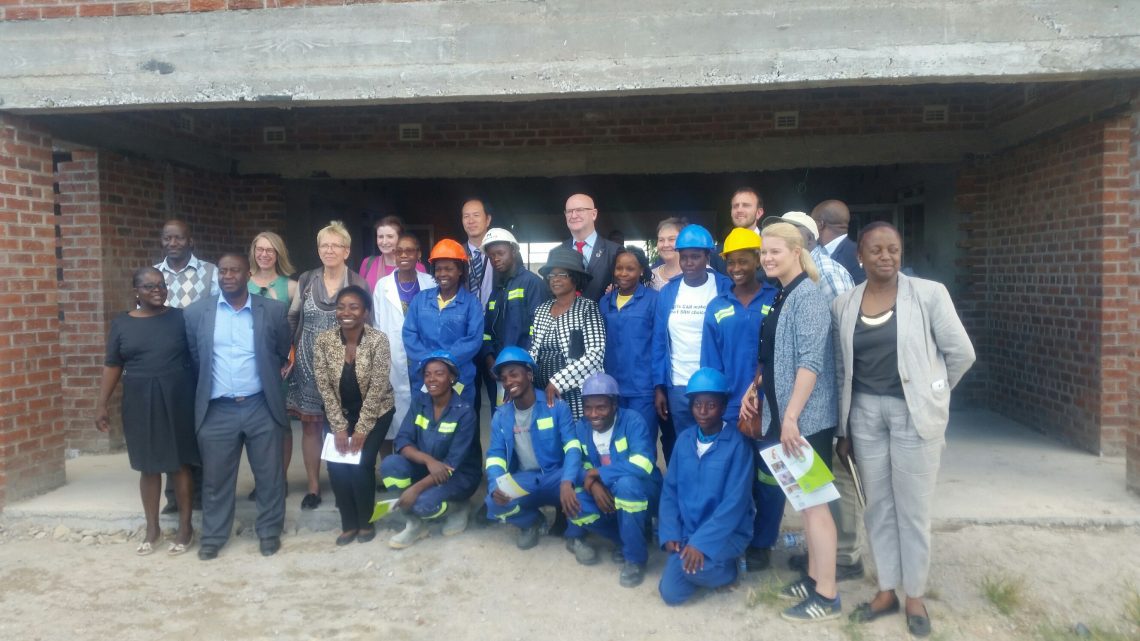By Byron Mutingwende
A delegation from the Swedish Parliament toured the Tariro Clinic and Youth Centre in Hopley to assess the impact of interventions by their government in the promotion of development in Zimbabwe.
Speaking on the sidelines of the tour, Aleksander Gabelic, the President of the United Nations Association of Sweden said his organisation facilitated the tour by the Swedish Members of Parliament (MPs) so as to give them knowledge of the impact that the work by the United Nations and other development partners has in transforming the lives of the poor.
“As the United Nations Association of Sweden, we seek to bring knowledge not only to our MPs in Sweden but to other citizens about the work of the United Nations and other development partners. We understand that the Swedish International Development Agency (SIDA) has partnered the international Labour Organisation, the City of Harare and UN agencies like the United Nations Population Fund (UNFPA) in coming up with the Tariro Clinic and Youth Centre. It thus becomes an experience-sharing and learning tour for our MPs,” Gabelic said.
The United Nations Association of Sweden holds public seminars, debates, meetings and training workshop to capacitate its citizens of that country about the UN work and solicit support to stem human catastrophes like the current problems in Myanmar and other countries.
Among the delegation from Sweden were Karin Johansson from the United Nations Association of Sweden, Krister Ornfjader, Member of parliament from the Social Democratic party of Sweden who is on the committee of foreign affairs and Kerstin Lundgren from the Centre party, just to mention a few.
Hopley is a peri-urban district located on the outskirts of Harare with a population of about 200 000 people, with about 65 000 aged between 10-24 years.. Young people have limited access to work opportunities and often rely on informal work characterised by decent work deficits and working poverty. Child marriages and teenage pregnancies are rife; at 18 percent and 21 percent respectively of the population. Seventy percent of women are mothers by the age of 24.
“In a bid to support young people to lead healthy, productive lives through reducing unwanted pregnancies, early marriages, incidences of HIV, school dropouts and creating employment opportunities in this cohort, the Hopley Joint Initiative on Adolescent and Youth Development (JPAYD) conducted training interventions in partnership with St. Peters’ Kubatana Vocational Training Centre.
“Fifty young people were trained in brick and block laying, carpentry and joinery, plumbing and electrical fittings and are now contributing to the construction of the polyclinic and multi-purpose youth centre under the supervision of master craftspersons. An additional fifty received training in cobblestone technology – a low cost employment intensive approach to the provision of access roads,” said Hopolang Phororo, the ILO Country Director for Namibia and Zimbabwe.
Beneficiaries of the skills training programme testified that the initiative had brought positive change in their lives. One of the beneficiaries, a young woman aged 28, said she was rescued from the jaws of poverty.
“When we were first identified for training, I thought it was one of those projects that would last a month or so. The plumbing expertise I learnt at college has positively impacted my life. I get my monthly salary on time and am now able to meet my basic needs and send my child to school. With the current economic hardships, one never knows, maybe I would be one of the commercial sex workers at Kwa Anthony were it not for the training,” she said.
Another young man, who is now a carpenter, said he managed to build himself a 2-roomed house and was no longer living on the streets or begging. He said he will use the skills gained even after the completion of the construction of Tariro Youth Centre and Clinic.
Simbarashe Sibanda, a programme officer for ILO in Harare said the initiative created a total of 4200 workdays for the community, 120 young apprentices, 60 artisans and 190 casual labourers. By the time the project is completed, a total of US$220 000 will have been transferred to workers in the community and small businesses around the site.
Upon request by Lundgren to understand the impact of the youth centre, Christine Gonese, the Zimbabwe Community Health Intervention Research (ZICHIRE) programme officer said her organisation is currently and will continue to provide integrated sexual reproductive health and rights programmes for the youths.
“Sista2Sista club members are going to have their sessions at the youth centre. Our project targets 10-24 year old girls and young women. The youth centre will provide safe space and confidence building spaces that help improve the self-efficacy of young women to access and utilise integrated services by empowering them to make responsible sexual reproductive health decisions and giving the girls social support within their community,” Gonese said.
The Sista2Sista club members will benefit from the vocational training skills offered at the youth centre. They will also be given life skills on self-awareness, entrepreneurship skills, financial management, problem solving strategies and communication.
Yu Yu, the UNFPA Zimbabwe Deputy Representative said the youth centre will provide education on integrated HIV prevention as well as SRHR and sexual and gender-based violence services. This would improve the parent to child communication on SRHR at family and community level.
Clemence Duri, the Acting Director of Health of the City of Harare acknowledged the cooperation and support from UNFPA and ILO with funding from the Health Development Fund.
“Hopley is characterised by high levels of migration, poor infrastructure, and low education and employment rates. These challenges are evidenced by poor development outcomes for young people. The current health infrastructure is inadequate and not up to established health standards,” Duri said.
The clinic will provide a full range of primary care services. In the second phase, the City of Harare is planning to build a maternity wing to remove the need for pregnant women to access surrounding polyclinics.






